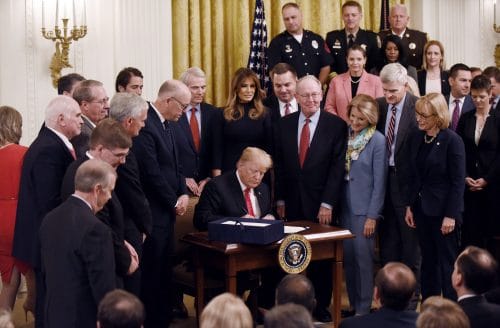Will Trump Be Partisan Brawler or Smart Dealmaker With Congress?

The American people settled on a divided government that reflected a divided nation in the midterm elections. The results foreshadow the wide gulf between the political parties and the narrow prospects for cooperation. Despite Republicans losing the House, President Trump will set the tone for the next two years as he embarks on his reelection campaign and Democrats jockey for position in their own campaign.
The results also provide a clear map of the geographic retrenchment of the parties and a dark omen for legislative cooperation, as Democrats will concentrate on cities and suburbs and Republicans will focus on small towns and rural areas. This cycle featured a Senate map that forced Democratic incumbents to defend rural red states friendly to President Trump. The “blue wave” of mobilization, which handed Democrats their best sweep of House seats since 1974, met the “red wall” of rural areas in the Senate races. While the policies and heated rhetoric of President Trump drew an electoral rebuke from women, first time voters, and those with college degrees, it was rewarded in equal parts by older, whiter, working class supporters that have now become the Republican base.
As American politics enter a period of sharper geographic division, the cultural and demographic gaps between the parties will grow even wider. Democrats will continue to solidify their urban and suburban coalition for continued control of the House, even in cities that have traditionally had more politically conservative politics. Expanding this coalition will also be key for their 2020 campaign strategy, as results in the South and Sunbelt, such as the narrow loss of Beto O’Rourke in Texas and too close to call races in Arizona and Florida, presage increased competition in once Republican strongholds. The Republicans will look to energize their rural base and whatever ground they can regain in the Rust Belt to focus on holding the Senate, where less populous states hold greater proportional sway, and focus on turning out white working class voters to provide a path to 270 votes in the Electoral College.
President Trump has already made clear that he feels emboldened by continued Republican control of the Senate and the prospect of a Democratic House acting as a political foil. All of this was demonstrated almost immediately the day after the elections as he hosted a bare knuckle press conference, fired Attorney General Jeff Sessions, and teased the prospect of further staff shake ups. Whatever window there may be in early 2019 for triangulation and compromise among President Trump, Senate Majority Leader Mitch McConnell, and presumed House Speaker Nancy Pelosi is already in danger of slamming shut.
There is talk of how infrastructure, health care, and immigration are areas with potential for a “grand bargain” as has been accomplished during divided government in the past. However, much will be made of the positioning for 2020, however, and the need to reward voters following the record turnout of the 2018 elections. An acrimonious “lame duck” period until the end of the year in Congress, especially if it is dominated by speculation about Robert Mueller and his special counsel investigation or the prospect of a limited government shutdown over funding for border security, will further narrow the slim prospects for any bargain.
Democrats are nevertheless excited about the prospect of subpoena power and the first real legislative branch oversight of the Trump administration. Republicans believe that executive power and Senate appointments will be enough to accomplish the remaining items on their agenda. In this, the partisans in both parties are mistaken. In order to achieve something lasting and concrete to help the American people before 2020, they will have to find a way to work together.
Whether or not President Trump and his team can compartmentalize the inevitable House investigations by avoiding a “warlike posture” for the sake of cooperation in other areas will be a key determinant of the tenor of the next two years. President Trump will be in control of a smaller but more pliant Republican caucus to carry out his agenda, while Democrats will have to demonstrate more than hypothetical proposals and define their policies beyond stark opposition to the administration.
Indeed, American politics for the next two years will be determined in large part by just what kind of legacy a still powerful President Trump wants to forge. If he wants to be a partisan brawler and unrepentant champion of his base, be prepared to hear more campaign rally vitriol as he travels across the nation. If, on the other hand, he seeks a lasting legacy as commander in chief, then “art of the deal” President Trump will, at long last, have to make his appearance on the political stage.
—
Dan Mahaffee is senior vice president and the director of policy at the Center for the Study of the Presidency and Congress in Washington.
—
This op-ed was originally published by The Hill.























